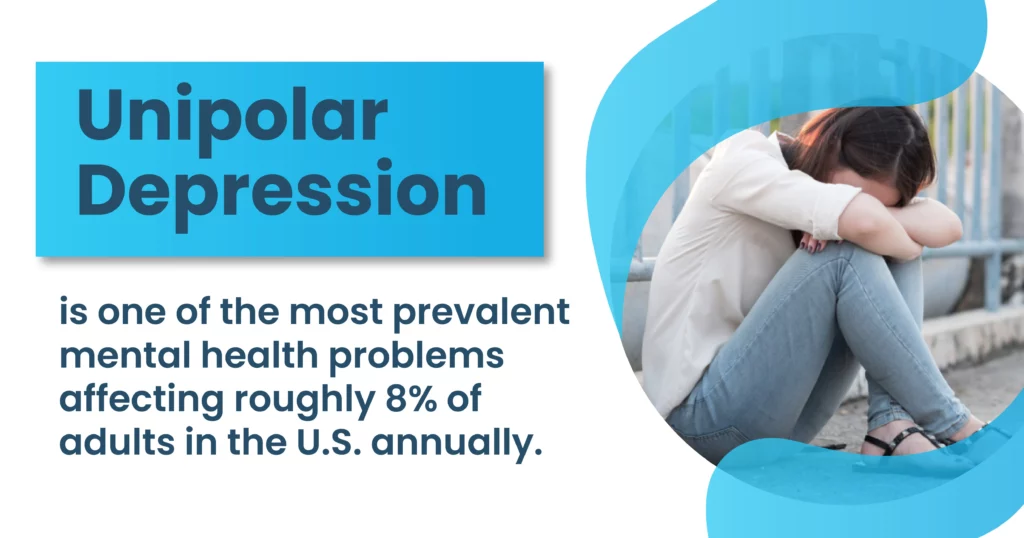
A severe form of depression characterized by sadness or irritability that affects sleep patterns, energy level, and either weight gain or loss is known as unipolar depression. Unipolar depression is one of the most prevalent mental health problems, affecting roughly 8% of adults in the US annually.
The National Institute of Mental Health estimates that 19.4 million young adults, or 7.8% of all adults in the United States, have experienced at least one episode of unipolar depression in their lifetime.
Psychotherapy, medication, and lifestyle changes can help to treat unipolar depression, but how? Keep reading to learn more.
Unipolar Depression: An Overview
Unipolar depression is characterized by persistently negative emotions and feelings, as opposed to bipolar depression, which frequently alternates between depression and mania.
According to the unipolar depression diagnostic criteria, unipolar depression does not change between the two emotional states.
This mental illness, also known as major depressive disorder (MDD), major depression, or clinical depression, is a medical condition that can significantly affect a person’s life in many important areas.
It interferes with a person’s ability to lead a healthy and satisfying life since it impacts their mood, behavior, and a number of physical processes.
People with this serious illness may occasionally have suicidal thoughts and believe life is not worth living. Being sad or “feeling the blues” is not the same as unipolar depression or other types of depression. It is not something a person can “snap out of” and frequently calls for ongoing professional care and assistance.
Is Unipolar Depression Different from Other Forms of Depression?
Unipolar depression differs from bipolar disorder primarily in that a person with unipolar depression solely feels a depressed mood, as opposed to bipolar depression, which is characterized by cycles of depression and mania.
People with bipolar depression frequently go through depressive episodes resembling those of major depressive illness, but they also go through periods of mania when their mood is extremely elevated.
A manic episode can result in exceptionally erratic behavior. They might act rashly or negatively, such as spending excessive money.
Unipolar depressives are not always depressed all the time. Some people may pretend to be joyful, smile, or have moments when their depression symptoms get better. Atypical depression, one of the subtypes of major depressive illness, is frequently persistent.
A person may be happy and have fewer symptoms when their condition improves since it responds better to changes in circumstances. The mood cycling with bipolar depression is not the same as this.
Symptoms of Unipolar Depression
Unipolar depression can cause serious health problems if ignored and left untreated. Below are some common symptoms of unipolar depression.
In case you and your loved one experience the following signs and symptoms, it’s advised to get medical attention so that on-time treatment can be started.
- On most days, a person experiences prolonged sadness or depression and low mood. They might feel unfulfilled, helpless, depressed, or uncertain about the future. These symptoms may appear in youngsters as behavioral problems or irritability.
- Activities that a person once found enjoyable may now cause them to feel little or no pleasure.
- A person may gain or lose five percent or more of their body weight without attempting it, or they may notice a change in their appetite by overeating or undereating.
- One may sleep excessively or insufficiently.
- A person may experience physical and emotional exhaustion to the point where it hinders their ability to stay motivated and complete everyday duties.
- An individual may find concentrating, paying attention, or thinking tricky. Brain fog may be a problem for certain people.
- People may experience distressing ideas about dying, hurting themselves, and suicidal ideation.
Unipolar Depression: Risk Factors
A number of factors result in unipolar depression, including genetic, environmental, brain chemistry, medication use, hormones, and complex life insecurities like losing your dream job or relationship difficulties, and the list goes on.
Let’s have a look at them in detail.
Biological Factors
Changes can hamper the ability to sustain stable emotions in the brain’s chemical balance brought on by stress and hereditary predisposition. Additionally, alterations in hormonal balances may make unipolar depression more likely to occur.
One of the most frequently recognized hypotheses holds that unipolar depression is brought on by an unbalanced level of neurotransmitters, naturally occurring chemicals in the brain and spinal cord.
Serotonin and norepinephrine have been determined to be two neurotransmitters involved in the disorder’s symptoms.
Psychological Factors
All people are affected by external circumstances differently, and everyone’s thoughts determine how they will live. This may have an impact on their level of happiness as well as their propensity to develop a mood illness like unipolar depression.
Our experiences profoundly impact how we see the world, with our childhood and adolescence being the most formative years.
The psychological well-being of children is significantly shaped by parenting. For instance, an abusive upbringing filled with disparaging remarks will probably alter that person’s perspective of the world for the worse.
People with this history may view situations differently when confronted with adverse circumstances later in life. Psychological issues can turn into extreme depression, sadness, and winter blues in the future.
Environmental Factors
It is only natural that we experience traumatic and tragic situations throughout our lives, which can lead to unipolar depression or other serious mental disorders.
Common triggers include the following.
- Prolonged arguments in partnerships, as well as with partners, family, friends, and coworkers.
- Losing a job, getting divorced, going through financial hardship, or losing a loved one.
- Lack of socializing or social isolation
- Stress brought on by interpersonal tension or performance expectations
Unipolar Depression Treatment Options
Research shows that around one-third of the 15.7 million American adults who have experienced depression have sought therapy.
The worst thing is people believe that having depression is embarrassing or a sign of weakness or that they can treat it on their own; people may put off getting help. Depression is a severe medical disease that requires expert care.
The good news is that most people with unipolar depression respond well to medication and psychotherapy.
Although it is recommended that individuals with a disorder also seek mental health experts to work through underlying issues triggering it, primary care physicians or psychiatrists can prescribe appropriate medications to ease them.
Below are some treatment options for unipolar depression.
Medications
An antidepressant works to cure unipolar depression and depressive symptoms depression by modifying certain brain chemicals. Antidepressants come in a wide variety of forms. The symptoms and medical background of the patient can influence the medication.
Antidepressant prescriptions are frequently the first step in treatment once a patient has been identified as having unipolar depression. Although antidepressants might cause specific adverse effects, these usually get milder the longer a person takes the drug.
An individual should not discontinue taking antidepressants before speaking with a doctor. On how to decrease the dose gradually and safely, a doctor can provide advice.
The antidepressants most commonly administered are SSRIs or selective serotonin reuptake inhibitors.
Serotonin, the neurotransmitter controlling moods and sleep, is frequently deficient in unipolar depressed patients.
Serotonin insufficiency is a common symptom of unipolar depression in patients. Serotonin is a neurotransmitter that controls mood and sleep cycles.
Serotonin can be found in greater concentrations in the brain thanks to SSRIs’ ability to inhibit its breakdown. Within six to eight weeks of starting an SSRI treatment, symptoms improve in between 40%-60% of patients.
Fluoxetine (Prozac) and citalopram are two popular SSRI drugs that have been demonstrated to have few side effects in most patients.
Tricyclic antidepressants are among the other drugs, and they are frequently administered after SSRI therapy has failed to alleviate depression. These antidepressants have more severe adverse effects, which also include tiredness.
Additionally, it is crucial to let your therapist know if you are pregnant or intend to get pregnant, as some antidepressants might not be suitable for nursing or pregnant women.
Therapy
Unipolar depression can be effectively treated with psychotherapy. Finding a therapist with experience addressing the disease is ideal.
Finding a therapist who makes you feel at ease is crucial; you want someone who will validate your emotions and provide you with emotional security. Interpersonal and cognitive-behavioral therapy are two types used to treat unipolar depression.
Types of Psychotherapy
People frequently picture therapy as a series of one-on-one sessions with a mental health practitioner. There are several therapies, though, and you might gain more or less from them depending on your circumstances and who you are.
Among the various forms of psychotherapy are:
Psychodynamic Therapy
Psychodynamic therapy for depression entails looking at the patient’s past to address a person’s current circumstance. The foundation of this therapy is Freudian psychoanalysis.
A psychoanalytic therapist will assist the patient in speaking about whatever they have going on in their mind to identify unconscious builds that manifest in the patient’s behavior during the session.
Conversation with the therapist helps the patient understand and become aware of how their past impacts their present behavior.
Cognitive Behavioral Therapy (CBT)
A brief, goal-based therapy called cognitive behavioral therapy (CBT) is the best option for treating depression.
Through problem-solving exercises and homework assignments, cognitive behavioral therapy (CBT) tries to lessen the negative or harmful thoughts and actions frequent among depressed people.
Most people who seek CBT for depression and extreme sadness attend twelve to twenty weekly sessions. However, many find benefits after only a few sessions. Both in-person and online CBT therapy sessions are options.
It emphasizes the relationship between patients’ moods and behaviors and their thoughts and beliefs. The therapist teaches the patient new ways of thinking to assist them in dealing with difficult or stressful circumstances.
Cognitive Analytical Therapy (CAT)
Talk therapy, called cognitive analytic therapy or CAT, primarily concentrates on connection patterns. It is predicated on how we take ourselves and how we interact with others are influenced by our early experiences.
This indicates that both healthy and beneficial repeated patterns of behavior can occasionally emerge from patterns of behavior or our expectations about other people’s behavior.
Combines CBT and psychodynamic therapy techniques to show patients how their behavior contributes to their problems and how to change them through self-help and experimentation.
CAT is a popular, secure therapy frequently applied to people who self-harm, those with eating disorders, sadness or anxiety, and personal or interpersonal difficulties.
In therapy, you will examine how you handle your relationships and deal with emotions or challenging circumstances. This will entail recognizing thought, emotion, and behavior patterns.
Interpersonal Psychotherapy (IPT)
IPT, also known as interpersonal therapy, is a concentrated, brief treatment for depression. Studies have demonstrated that for mild to moderate types of clinical depression, IPT, which deals with intimacy and personal concerns, may at least be as beneficial as short-term antidepressant medication.
It was first created to treat adult depression. Still, research has shown that it is also helpful in treating adolescent depression, and it is frequently suggested as a treatment for the increased risk of depression in kids.
Explores how a patient’s happiness and level of mental health are affected by events in their life involving relationships with others. This type of psychotherapy is predicated on the notion that the caliber of interpersonal connections causes a person’s psychological problems.
Systemic Therapy
Systemic therapy, commonly referred to as family therapy or couple therapy, is a sort of psychotherapy that focuses on the connections between a person’s relationships, behavioral patterns, and life decisions and troubles.
The idea is derived from the theory of systems, which examines how various system elements interact to maintain the stability and equilibrium of the entire system. Psychotherapy addresses people individually and as one unit and aims to solve their issues together.
Humanistic Therapy
Talk therapy that emphasizes a person’s unique nature rather than supposing that groups of people with similar traits share the same concerns is known as humanistic therapy, also known as humanism.
Humanistic therapists strive to consider the whole person, particularly their positive characteristics and room for improvement, not just from their professional perspective but also from a client’s subjective perception of their behavior.
Depression, anxiety, panic disorders, personality disorders, schizophrenia, addiction, and issues with inter and intra-personal relationships can all be treated with humanistic therapy.
The method can also help those who lack “wholeness,” looking for personal meaning, have poor self-esteem, have trouble realizing their potential or finding a purpose in life, and are uncomfortable with who they are.
In sessions, the focus is on a person’s positive characteristics and behaviors as well as on helping them learn how to use their intuition to achieve wisdom, growth, healing, and fulfillment.
Examine the patient from both the therapist’s and the patient’s point of view, considering how they perceive themselves.
This treatment strongly emphasizes a patient’s positive characteristics and behaviors and capacity to make the most of their unique strengths to experience new growth, healing, and fulfillment.
Lifestyle Changes to Treat Unipolar Depression
Making positive lifestyle changes might be helpful in addition to treatment and medication to reduce the symptoms of unipolar depression.
You may significantly enhance your mental health and become better at handling life’s challenges by making minor changes to your everyday routine.
Here are a few suggestions for beneficial, healthy habits:
Get Enough Sleep
It is advised that most people receive at least eight hours of sleep per night to feel rested and have a steady and upbeat attitude. Consult your doctor if you are having problems sleeping to get help about what you may do to achieve more regular and restful sleep.
Keep Yourself Busy
Studies have shown the benefit of staying busy. Many medical professionals advise patients to keep themselves in multiple activities, such as household chores, crafting, jobs, cultivating, and so on.
Additionally, you can plan with your friends, family members, colleagues, and the individuals with whom you want to spend time by making coffee plans and evening walks. Spending time with your loved ones is the activity that will keep you occupied and happy in the cheapest way.
Eat a Well-Balanced Diet
A diet full of essential vitamins, proteins, and carbohydrates is necessary to live a healthy and happy life.
Extensive research has shown that foods high in vitamin B, whole grains, pork, beans, dark green vegetables, and fruits can help some persons with unipolar depression.
Lean meat, yogurt, and other foods high in protein have also been demonstrated to increase alertness and energy.
Avoid Alcohol Consumption
Avoid drinking alcohol since it depresses the nervous system and can exacerbate depression symptoms. Heavy drinking can also make antidepressant drugs less effective. Also, alcohol addiction is more likely to develop in those with unipolar depression.
For these reasons, it is recommended that those who suffer from mood disorders abstain from alcohol altogether or exercise caution if they do, such as knowing if alcohol use is compatible with their antidepressants.
Exercise Daily
Studies have shown that for some people, regular exercise can reduce the symptoms of depression just as effectively as antidepressants. Endorphins are brain chemicals released during exercise, especially vigorous, and have a good psychological impact.
Meditatate
Several studies have shown peaceful activities such as meditation and yoga can be beneficial in curing symptoms of unipolar depression.
If you are experiencing symptoms of extreme depression along with medicines, you can utilize meditation habits to overcome irritability and sadness.
Meditation also lessens suicidal thoughts and other mental health disorders in the cheapest way. Your mental health expert can recommend meditation for some time to treat unipolar depression.
Frequently Asked Questions (FAQs)
What is meant by the term unipolar depression?
One of the most dangerous and prevalent mood disorders is unipolar depression. People who suffer from this type of depression have persistent emotions of sadness or a lack of interest in engaging with the outside world. It can also cause several physical health problems, including heart disease, memory loss, and negative feelings.
What are the three main symptoms of unipolar depression?
The main signs and symptoms of unipolar depression are listed below:• Prolonged feelings of melancholy or anger.
• Loss of interest in the majority of previously enjoyable activities.
• An abrupt change in appetite or weight loss and gain.
What kind of depression is unipolar depression?
Unipolar depression refers to a distinction between major depression and bipolar depression, which describes an alternating state of depression and mania. Unipolar depression, in contrast, concentrates on your lows or any unfavorable feelings and symptoms you may have gone through.
Get Professional Treatment at Haven Detox-South Florida to Battle Unipolar Depression.
Being depressed can cause health issues as well as a disturbance in carrying out daily tasks. In case you and your loved one are experiencing depression, sadness, low energy levels, and other mental health issues, let Haven Detox-South Florida help you out.
Haven Detox-South Florida is one of the most reliable mental health providers in the United States of America, with the noble vision to promote mental stability and alcohol-free life.
We offer a wide range of programs, including residential treatment programs, medical detox, counseling, and multiple therapies to assist people dealing with substance abuse disorders, unipolar depression, and mental health disorders.
We are proud that our mental health professionals are highly qualified from prestigious medical institutes. They serve our patients by listening to their concerns with keen attention, kindness, and passion and help them to get back to a happy life.
Call us right away at 1 561-220-3647 to learn more about our service charges and treatment options.






